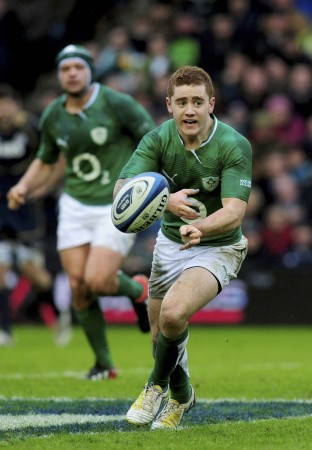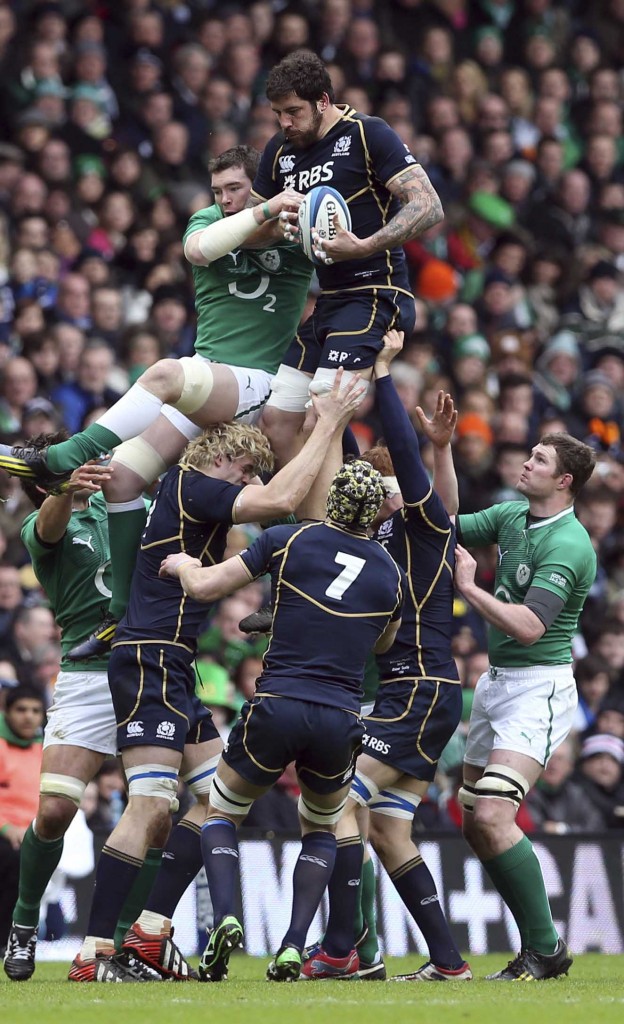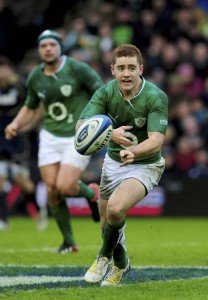
Bloodied but unbowed: A battered and bruised Kelly Brown celebrates with fans after Scotland's victory over Ireland
By Alan Dymock
ON SUNDAY there were so many numbers being thrown around, but the shock of it all was that it was Ireland, rather than Scotland, whose number was up.
Heads spun as percentages and figures swirled. Scotland conceded 16 penalties, had 29% possession and made no linebreaks. Ireland had 71% of the ball, only had to bend for 44 tackles and offered up four searing line breaks. Ireland were unquestionably on top, looking at the damned statistics, but still they ended up losing 12-8.
It was a day to lock the boffins in the closet. No bookie could have predicted the outcome of that RBS 6 Nations match based on ugly maths. Everything came down to something more pure; something the common fan and experts alike pull out when they are at a loss to explain odds-defying results: heart.
Scotland simply wanted to beat Ireland more than Ireland wanted not to be beaten, and despite a spinning Craig Gilroy try, the Scots were not to be defeated.
Break after break came, with Paddy Jackson able to trot and cut with his teammates, safe in the knowledge that the Scots midfield were too busy flailing to hit. Luke Marshall twice darted through and Keith Earls treated himself to a rather wasteful journey into Scotland’s 22 before Sean O’Brien set up a score with his running. Ireland had the legs. What they temporarily lacked was composure and nous and it’s up to Declan Kidney to re-find it.
Scotland repeatedly tightened on their line, sometimes willing to allow penalty kicks rather than tries, and with poor Paddy Jackson unable to match his promising link play with post-targeting punts those penalties were washed out. It felt like hit, hit, hit was followed by a silly penalty and a missed kick.
It made little sense, but it worked.
That is not to say that it was not taxing. The broken remains of Kelly Brown’s face tells you that laying down human speed bumps comes at the price of vanity. However, the reward for such selflessness is great. So for every knee-jarring jump for sloppy Irish lineout ball that Jim Hamilton put in, for every hit Geoff Cross absorbed, it allowed Scotland a chance to rebound.
Scotland effectively curled up, taking the dull, thudding hits of a red faced assailant, before unfurling and throwing a few quick hits of their own. It was ugly, ungainly and is unlikely to yield the same results against any other opponent, but on that day in Edinburgh it worked.
For Ireland they must now reassess. Without Sexton they lack a rudder. The right thing to do would be to stand by Jackson, because he is the future and can improve on kicking stats. Ronan O’Gara, on the other hand, appears to lack the fortitude to make use of his preposterously educated boot at the present time. His senseless lash into dead space in front of Scotland’s most dangerous players, in Ireland’s half, demonstrated this expertly.
Many men are out injured and they have to expect big players will return, but they need to ensure they cannot be so wasteful again. Otherwise Declan Kidney is striding towards quicksand and the players are urging him on.
Mind you, perhaps a complete change would be good for Ireland. After all, few expected Scott Johnson to do much with an abused Scotland side after the grand plans of Andy Robinson, and the interim coach has cajoled them into 6 Nations contention.







